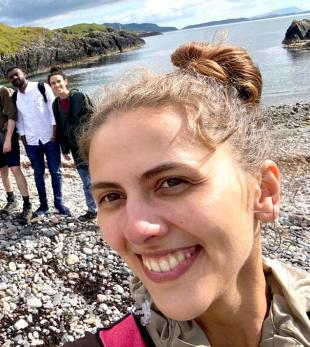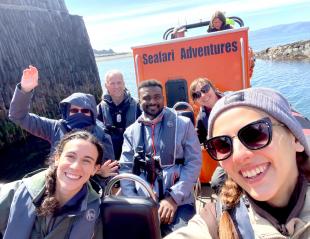About Nadia
Nadia recently completed an MSc in Mechanical Engineering at the University of Edinburgh and was seeking to develop her knowledge further with a PhD. IDCORE was appealing as it created a bridge between industrial experience and academic research in the rewarding, rapidly expanding area of offshore renewables.
Prior to working on this, Nadia contributed to another ORE Catapult project during which she learnt how to code using Python. The project was about developing a simple tool that can estimate the weather downtime for a group of tasks depending on their duration and weather data. She has felt integrated into the team, involved in multiple different team meetings and invited to team calls and updates.
Nadia’s Project
Nadia’s project partner is the Offshore Renewable Energy (ORE) Catapult based in Glasgow, the UK’s leading technology innovation and research centre for offshore renewables. Her project involves the development of a tool that calculates the combined costs of operation and maintenance on offshore windfarms, called COMPASS (Combined Operations, People, Assets and Systems Simulation). COMPASS incorporates different factors, such as how many people and what vessels need to be involved in each maintenance activity, the infrastructure required, and the weather data at the location of a farm. These inputs enable a cost to be calculated and standardised across multiple projects and so is used by ORE Catapult teams to assess the impact of different innovations.
She is now looking forward to working on conference papers and journal articles that model COMPASS case studies using data from ORE Catapult and their broader contacts. She recently had a paper published which explores which operation and maintenance strategy is more economically viable: having an offshore maintenance base with accommodation vs an operational vessel that has less accommodation but is mobile. Understanding these dynamics is essential as practices are developed to service the future wind farms that will be located further offshore and in harsher environments.
IDCORE Benefits
Nadia has enjoyed the great mix of IDCORE course mates and the dedicated office and space available to them on campus. A highlight of her experience so far has been the trip to the Scottish Association for Marine Science (SAMS) in Oban, where the cohort counted dolphins from their boat and searched for crustaceans on the sea floor as part of surveying surrounding marine life. Nadia gained a different perspective and learnt the ways to reduce the effects of offshore renewables construction on marine life.








